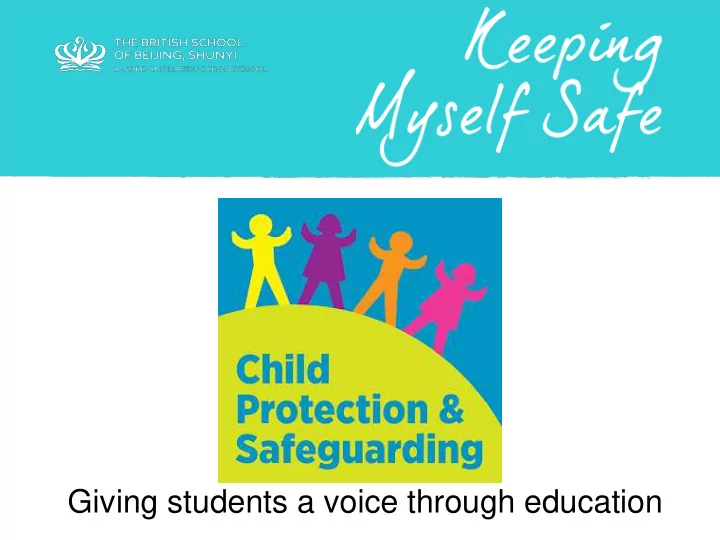

Giving students a voice through education
Research conducted by the Centers for Disease Control (CDC) estimates that approximately 1 in 6 boys and 1 in 4 girls are sexually abused before the age of 18. Only 10% of perpetrators were strangers to the child. Protective behaviours should be taught from the age of 2 by naming body parts and talking about personal boundaries. ‘Keeping Myself Safe ’ is a child protection unit that gives every student from EYFS to Year 6, an understanding of recognising and responding to issues around child protection. Education is the key to giving our students a voice and helping to protect our children.
A PSHE child protection curriculum gives children who are victims of abuse the education to judge earlier that it is wrong and develop the confidence to report. Even young children can be taught ways to protect themselves from abuse. They can be ‘enlightened without being frightened’. They can be taught to network with trusted adults. In the past, many children and young people have received little or no information about what constitutes abuse or when, how and where abuse occurs. It is important to give students enough information so that, if faced with a situation of potential abuse, they can react quickly and seek protection effectively.
It is important that students learn: • the correct name for their body parts • about feeling safe and their right to be safe • to recognise appropriate and inappropriate behaviours • that appropriate touching is an important part of positive relationships but they get to decide if they want to share hugs and kisses with someone • that they have a right to say NO to a person who touches them inappropriately or threatens their safety • that it is important to tell trusted adults about such situations • that they may have to keep on telling people until they are believed
Safeguarding in schools is more than simply keeping pupils safe in school. We leave them vulnerable if we do not do everything we can to equip them to keep themselves safe in school, outside school and in the future. PSHE education lessons provide the best context for this learning, as part of a whole school approach and can contribute to safeguarding. Nord Anglia Education and all our schools accept and adhere to these basic principles: Every student is entitled to a rich and broad curriculum that helps to equip them to keep themselves safe. Ensure that safeguarding is addressed through the curriculum.
Term 1 P.S.H.E- Keeping Myself Safe introduction Nursery Year 1 Year 2 And Reception This unit does not include online safety as that is taught throughout our Computing curriculum. Year 3 Year 4 Year 5 Year 6 complete this unit of learning in Term 3. 8 October 2016 | SLT presentation
Nursery and Reception Curriculum Learning about • PANTS rules • naming body parts and know which parts should be private. (under their pants) • yes and no touch • no, go, tell • safety network
Year 1 Curriculum Learning about 2.Safe strangers and danger strangers 1. Key relationships 3. People who make them feel safe 5. Safety Network 4. yes/no feelings and yes/no touches
Year 2 Curriculum 3.Safe 2. Feelings and Learning about strangers and emotions danger 1. People who make them feel safe strangers 5. Safety Network 4. yes/no feelings and yes/no touches
Year 3 Curriculum Learning about 2. Boundaries 1. Personal Space 3. Safe strangers and danger strangers 5. Safety network 4. Safe and unsafe secrets
Year 4 Curriculum 2. yes/no feelings and yes/no touches Learning about 1.Emotions and feelings 5.Secrets and surprises, Safe/unsafe 3. No. Go. Tell situations 4. Safety network
Year 4 Curriculum-Book- Let’s Talk About Body Boundaries, Consent and Respect
2. Good and bad touch Learning about 1. Friendships 3. My body belongs to me 4. No. Go. Tell 5. Adults we come in contact with- safety network
My Body Belongs To Me [Animated Short Film].mp4
• This message needs to be re- enforced at home. • Talk to your child about personal safety. • Visit the school website after this workshop to view this PowerPoint and a guide for parents that will help you speak with your children.
Parents guide to assist you in talking to your child/ren. PSHE\Childwise_ParentInformation.pdf
www.britishschool.org.cn/shunyi
Recommend
More recommend